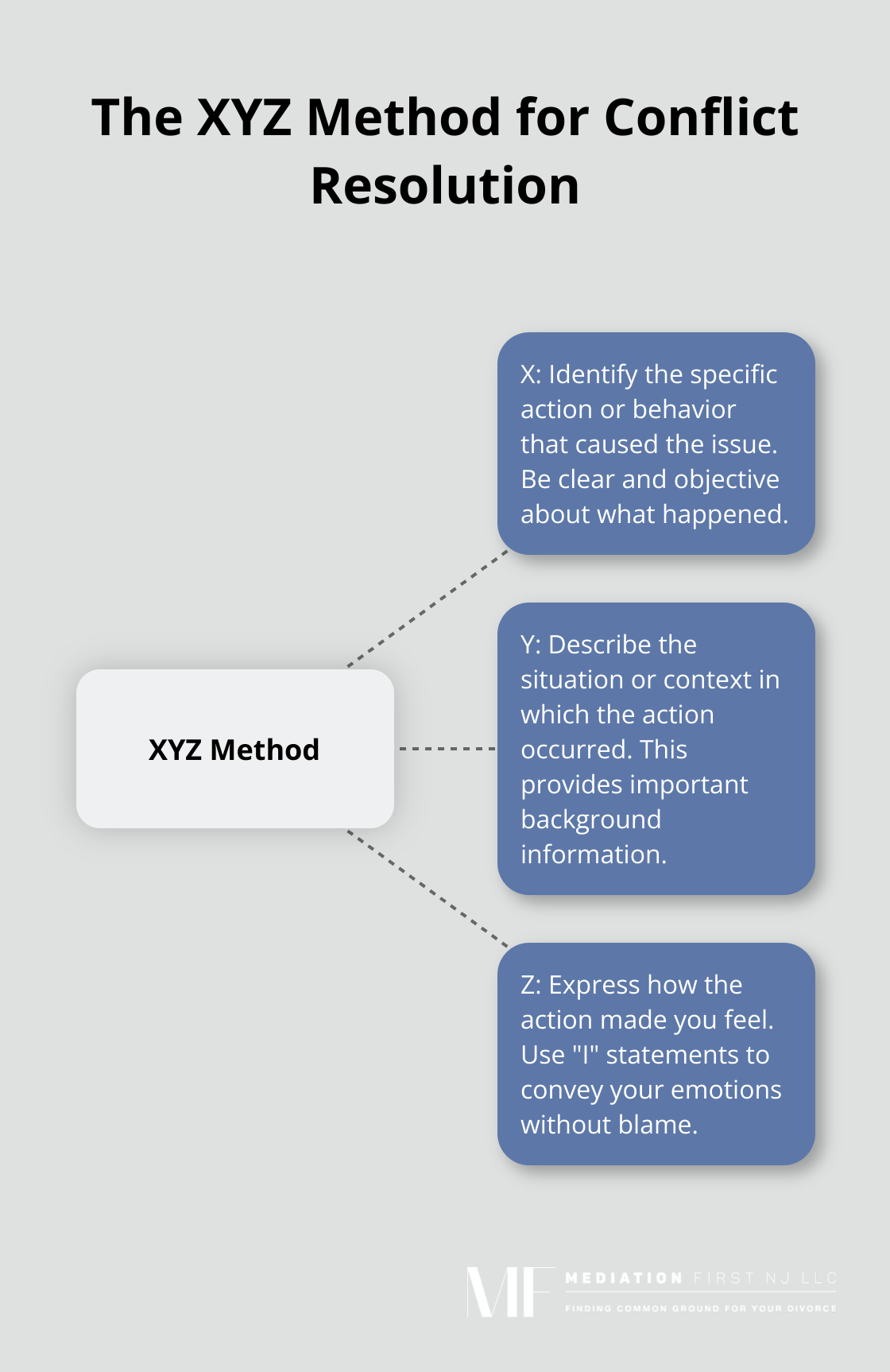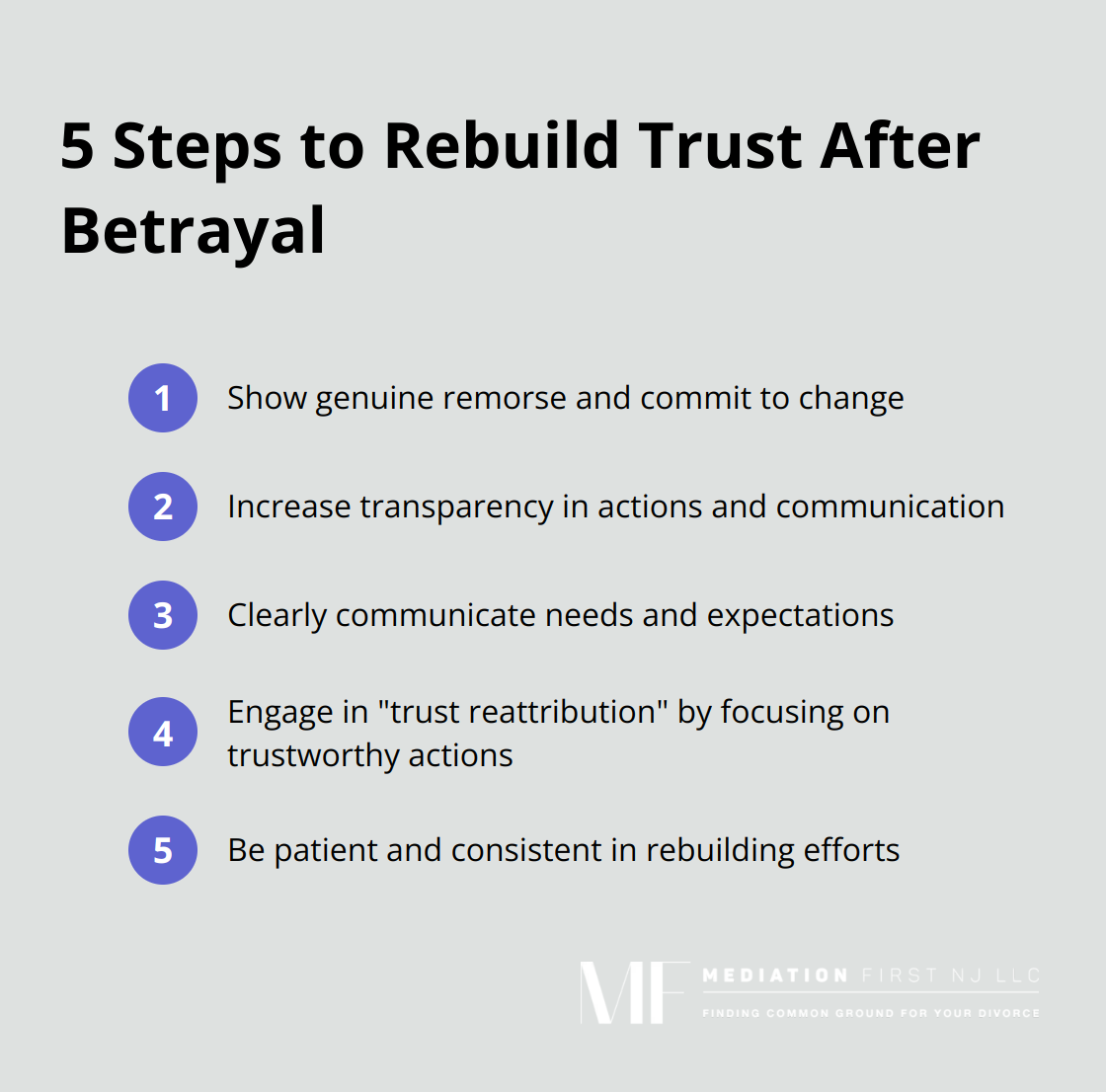At Mediation First NJ LLC, we understand that building a lasting relationship requires dedication and effort. Strong partnerships don’t happen by chance; they’re built through intentional actions and strategies.
In this post, we’ll explore key techniques for fostering enduring connections with your partner. From effective communication to nurturing intimacy, these insights will help you create a resilient and fulfilling relationship.
How Can We Communicate Better?
Communication forms the foundation of any strong relationship. At Mediation First NJ LLC, we’ve observed how effective communication can transform even the most challenging family disputes. Here are practical strategies to enhance your communication skills and strengthen your relationships.
Master the Art of Active Listening
Active listening involves more than just hearing words. It requires full engagement with your partner’s message. When your partner speaks, eliminate distractions like phones or tablets. Make eye contact and use non-verbal cues (such as nodding) to show you’re engaged. After they finish speaking, paraphrase what you’ve heard to ensure understanding. This technique, known as reflective listening, can reduce misunderstandings and demonstrate that you value your partner’s perspective.
Express Emotions Clearly and Respectfully
Clear and respectful expression of emotions is essential for maintaining healthy relationships. Use “I” statements to convey your feelings without blaming or attacking. For example, instead of saying “You never listen to me,” try “I feel unheard when we talk about important issues.” This approach helps your partner understand your perspective without feeling defensive.
Timing also plays a key role. If you feel overwhelmed or angry, take a short break to calm down before discussing sensitive topics. This pause can prevent heated arguments and lead to more productive conversations.
Navigate Conflicts Constructively
Conflict will occur in any relationship, but your handling of it can make or break your partnership. When disagreements arise, focus on the issue at hand rather than attacking your partner’s character. Use specific examples to illustrate your points, and avoid generalizations like “always” or “never.”
Try the XYZ method: “When you do X in situation Y, I feel Z.” This formula can help you communicate more effectively and be attuned to your partner, especially when conflict arises. For instance, “When you check your phone during our conversations, I feel ignored and unimportant.”

The goal of conflict resolution isn’t to win an argument, but to find a solution that works for both parties. Open yourself to compromise and try to see the situation from your partner’s perspective. This approach can turn conflicts into opportunities for growth and deeper understanding.
Practice Non-Verbal Communication
Non-verbal cues often speak louder than words. Pay attention to your body language, facial expressions, and tone of voice. Maintain an open posture (uncrossed arms and legs) to show receptiveness. Make eye contact to demonstrate engagement and sincerity. Your tone of voice should match your words; a gentle tone can soften even difficult messages.
Establish Regular Check-Ins
Set aside time for regular relationship check-ins. These dedicated conversations allow you to discuss any issues before they escalate, celebrate successes, and align your goals. Try to create a safe, judgment-free zone where both partners can express themselves openly. These check-ins can significantly improve your overall communication and strengthen your bond.
Implementing these communication strategies can create a more open, honest, and supportive relationship. Effective communication requires practice, but the rewards – stronger bonds, fewer misunderstandings, and more satisfying relationships – prove invaluable. As we move forward, let’s explore how trust and honesty serve as pillars of a lasting partnership.
How Can We Build Trust in Our Relationship?
Trust forms the bedrock of any lasting relationship. It’s the invisible force that allows partners to feel secure, vulnerable, and connected. Trust can make or break relationships, especially during challenging times like divorce or family disputes.
Consistency Is Key
Building trust starts with consistency. Your words and actions should align, creating a pattern of reliability. If you make a promise, follow through. If you can’t keep a commitment, communicate openly about it. Small, consistent acts of trustworthiness accumulate over time, forming a solid foundation of trust.
Embrace Vulnerability
Vulnerability might seem counterintuitive when building trust, but it’s essential. Share your fears, dreams, and insecurities with your partner. This openness creates emotional intimacy and shows that you trust them with your true self.
Practice Radical Honesty
Honesty goes beyond simply not lying. It involves being truthful about your thoughts, feelings, and actions, even when it’s uncomfortable. If you’ve made a mistake, own up to it quickly. Trying to hide or downplay errors often leads to more significant trust issues down the line.
One practical tip is to establish a “no secrets” policy in your relationship. This doesn’t mean you can’t have privacy, but it does mean avoiding intentional deception.
Rebuild Trust After Betrayal
If trust has been broken, rebuilding it requires patience and dedication from both partners. The betraying partner must show genuine remorse and a commitment to change. This might involve being more transparent about their whereabouts or allowing access to their phone or email.
For the betrayed partner, it’s crucial to communicate their needs clearly. What specific actions would help rebuild trust? Be specific and realistic in your expectations.

A study published in the Journal of Comparative Family Studies found that couples who successfully rebuilt trust after infidelity often engaged in a process they called “trust reattribution.” This involves consciously focusing on and acknowledging the trustworthy actions of their partner, rather than dwelling on past betrayals.
Foster Open Communication
Open communication serves as a cornerstone for building and maintaining trust. Create a safe space where both partners feel comfortable expressing their thoughts and feelings without fear of judgment or reprisal. Regular check-ins can provide opportunities to address concerns before they escalate into larger issues.
Trust is the invisible thread that weaves strong relationships. Prioritize consistency, embrace vulnerability, practice radical honesty, and learn how to rebuild trust when it’s broken. These actions will create a relationship built on a solid foundation of mutual trust and respect. Now, let’s explore how to nurture intimacy and connection within your relationship, building on this foundation of trust.
How Can We Deepen Our Connection?
Prioritize Emotional Intimacy
Emotional intimacy involves sharing your innermost thoughts, feelings, and experiences with your partner. It creates a safe space where both of you feel understood and accepted. To foster emotional intimacy, try these strategies:
- Be vulnerable: Share your fears, dreams, and insecurities. This openness invites your partner to do the same, creating a deeper bond.
- Show empathy: When your partner shares something personal, respond with understanding and support. Avoid judgment or trying to “fix” their problems unless they specifically ask for solutions.
- Express appreciation: Tell your partner what you admire about them regularly. Be specific – instead of a generic “You’re great,” try “I really appreciate how patient you were with the kids today.”
Create Quality Time Together
In our fast-paced world, it’s easy to fall into routines that don’t involve meaningful interaction. Make a conscious effort to create quality time with your partner:
- Schedule regular date nights: Set aside time for just the two of you, even if it’s just once a month. Try new activities or revisit old favorites.
- Engage in shared hobbies: Find activities you both enjoy and make time for them. This could be anything from cooking together to taking dance classes.
- Practice active listening: During conversations, put away distractions (like phones or tablets). Make eye contact and show genuine interest in what your partner is saying.
Maintain Individual Identity
While connection is important, it’s equally vital to maintain your individual identity within the relationship. This balance keeps the relationship dynamic and prevents codependency:
- Pursue personal interests: Encourage each other to maintain hobbies and friendships outside the relationship.
- Respect boundaries: Recognize that your partner may need alone time or space. Respecting these needs can actually strengthen your bond.
- Support each other’s goals: Cheer on your partner’s individual achievements and aspirations. This mutual support can enhance your connection.
Foster Physical Intimacy
Physical intimacy goes beyond sexual contact. It includes all forms of physical affection that create closeness:

Practice Gratitude Together
Expressing gratitude can significantly improve relationship satisfaction:
- Share daily appreciations: Each day, tell your partner one thing you’re grateful for about them or your relationship.
- Keep a gratitude journal: Write down things you appreciate about your partner and share them periodically.
- Celebrate small wins: Acknowledge and celebrate each other’s accomplishments, no matter how small.
Final Thoughts
Building a lasting relationship demands dedication and a willingness to grow together. We explored essential strategies for fostering strong partnerships, including effective communication, trust-building, and nurturing intimacy. These tools form the foundation of a healthy, thriving relationship that can withstand the test of time.
Successful relationships result from consistent, intentional actions and a commitment to mutual understanding and support. We encourage you to implement these strategies in your own relationships, starting small and celebrating progress along the way. Every step you take towards improving your relationship adds value to your connection.
At Mediation First NJ LLC, we understand the complexities of relationships, especially during challenging times (like divorce or family disputes). Our professional mediation services foster constructive communication and collaboration, helping couples and families navigate difficult transitions. We believe in the power of open dialogue to build lasting, positive relationships, even in the face of significant changes.

